E-mail Gina's (Click here)
Aitutaki Lagoon Weddings with the Queen
The Discovery of Aitutaki -The Story of Ru Enua
Flyfish_for_ Bonefish_in_Aitutaki_Lagoon
The Teal Story - by Queen Manarangi
Terei - a South Seas novel by Desmond Clarke -_excerpts
Terei- A Cook Islands Romance - Aitutaki Lagoon Wedding and Honeymoon.
Anne and Henry's South Seas Wedding on Aitutaki Lagoon
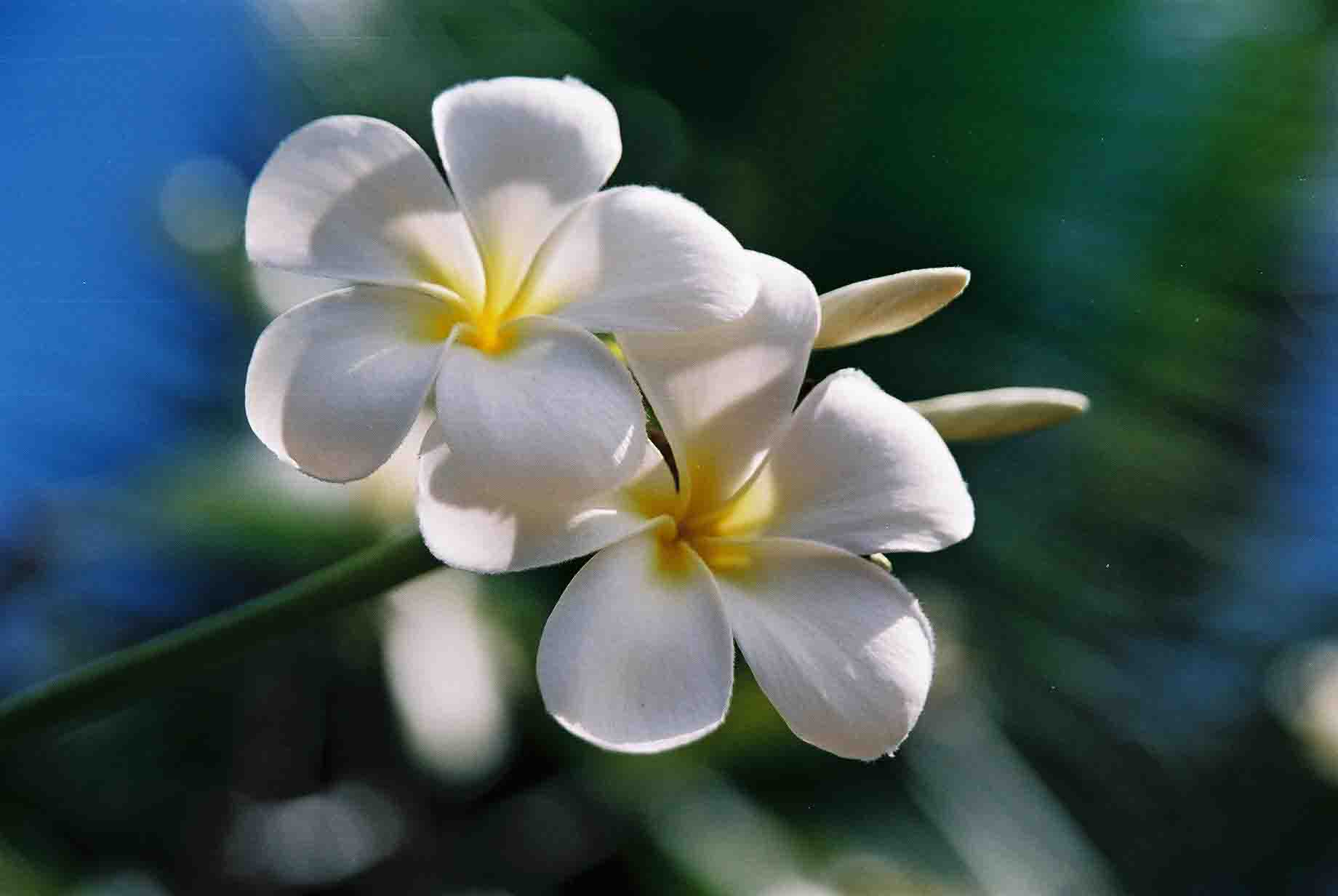
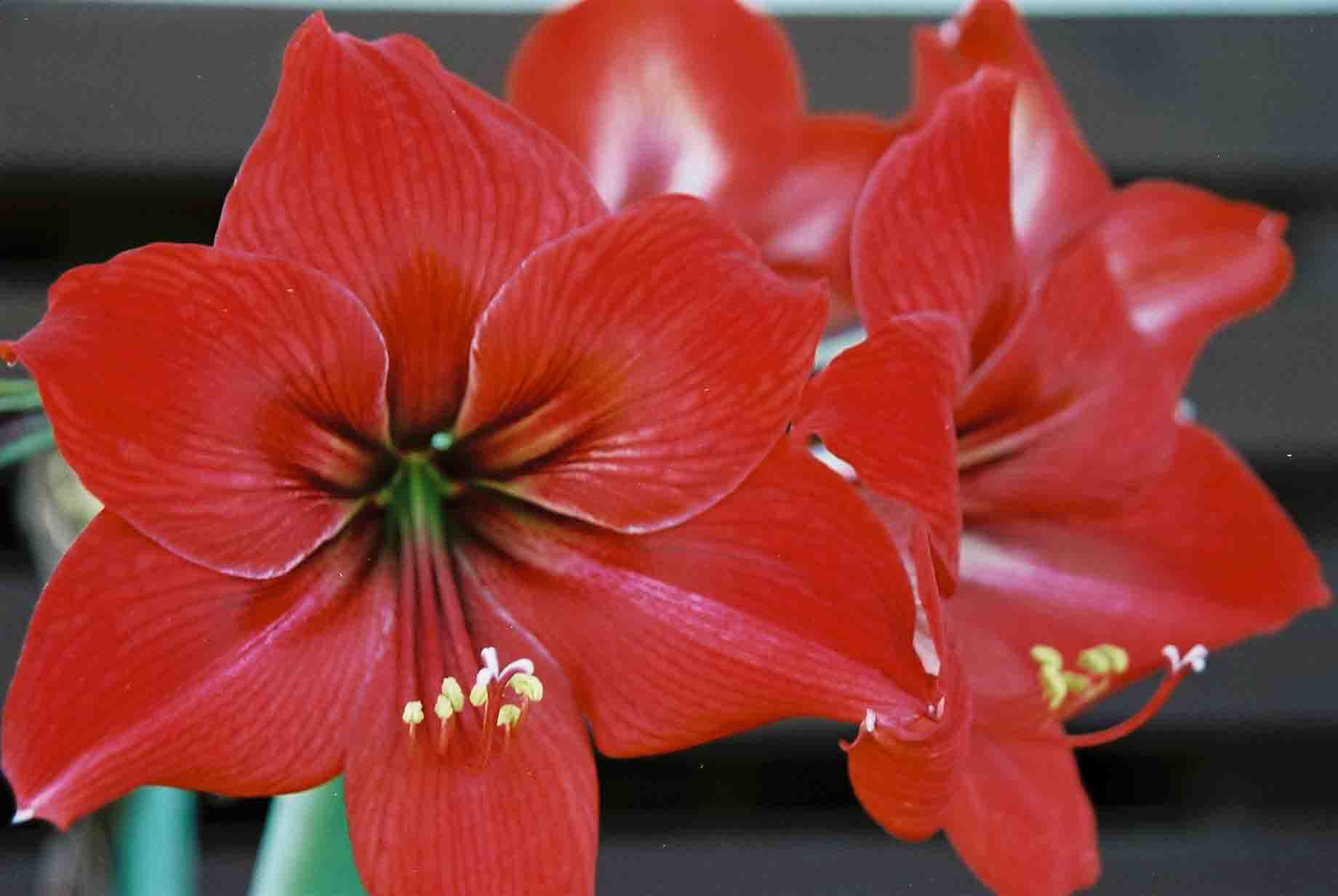
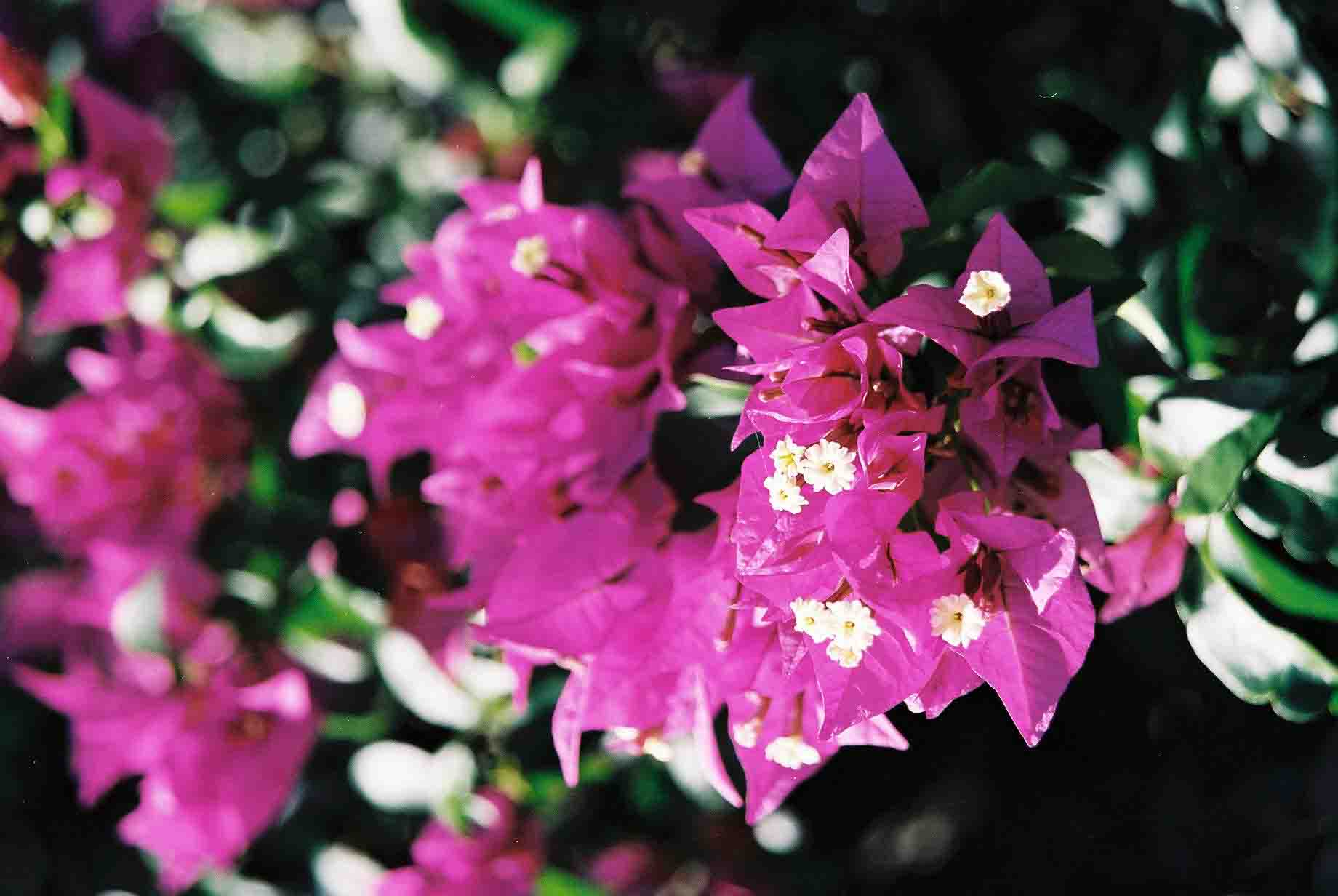
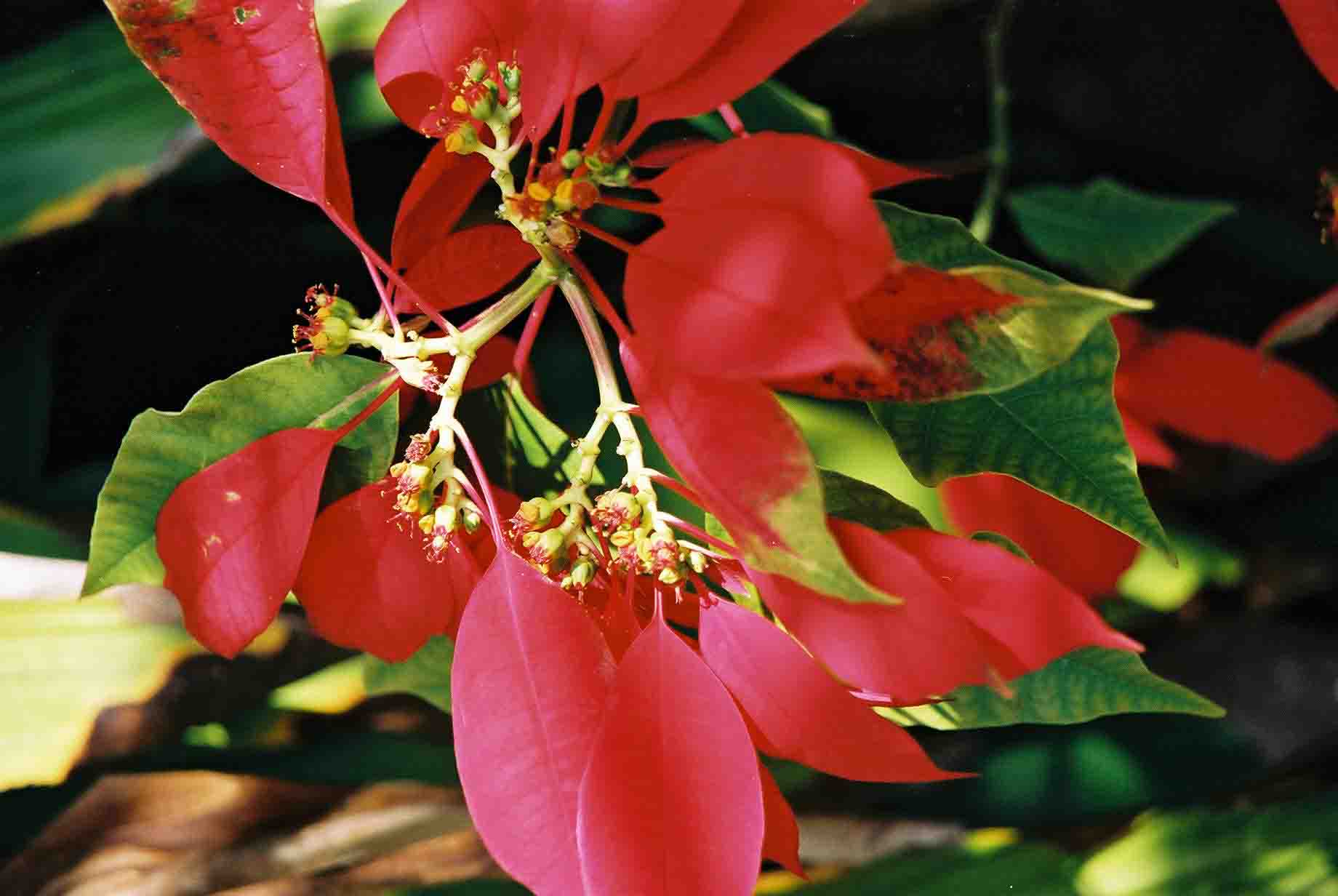
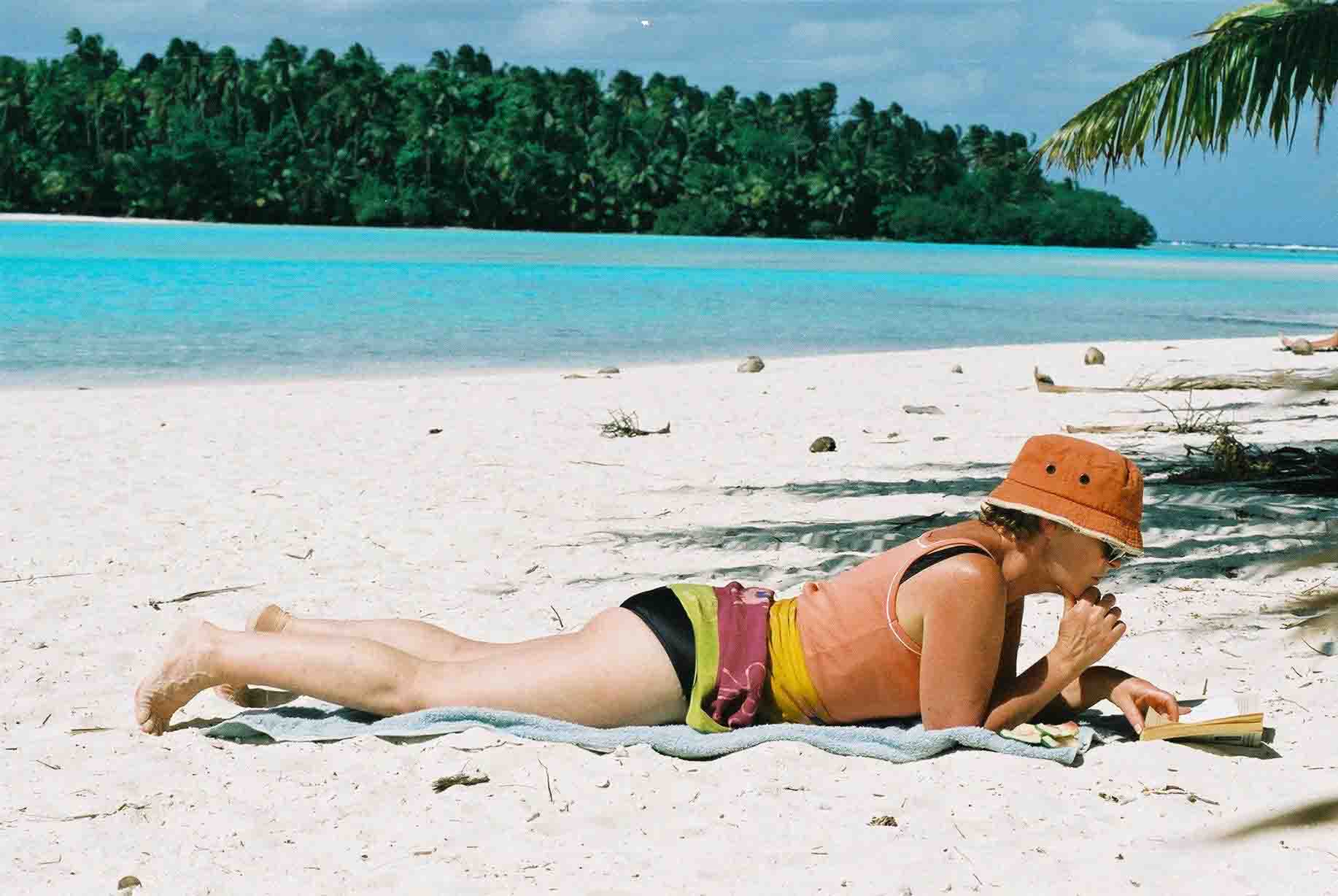
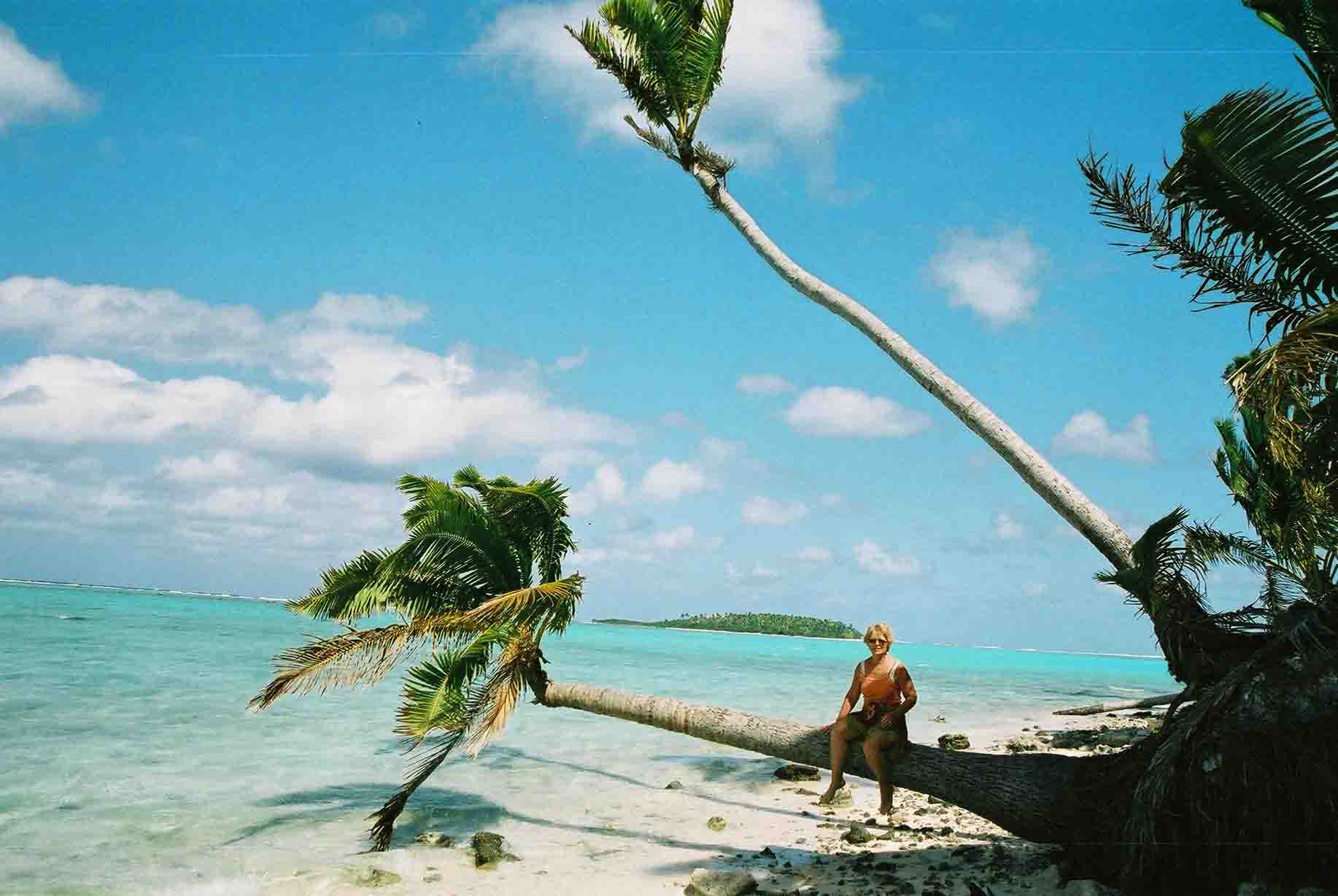
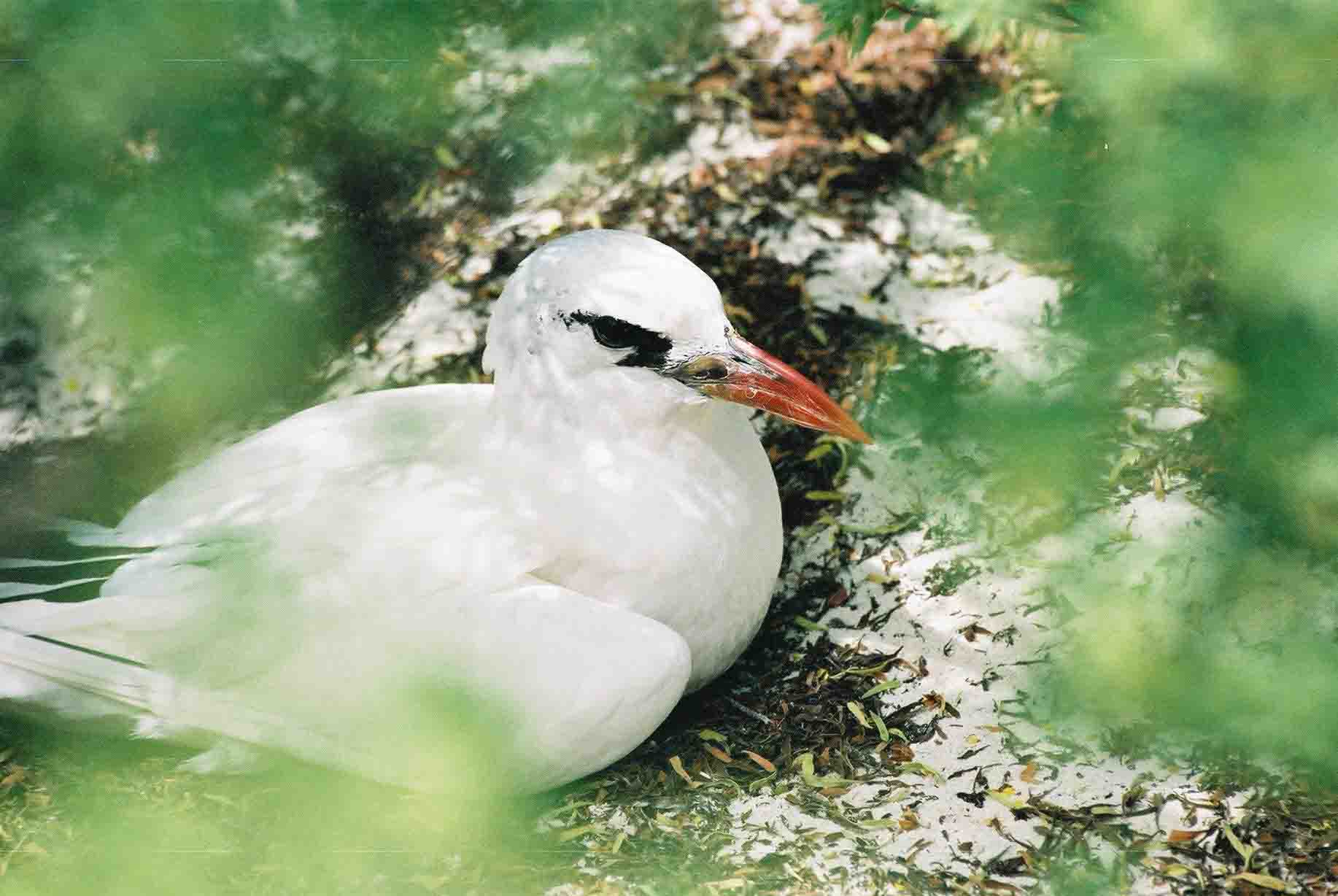
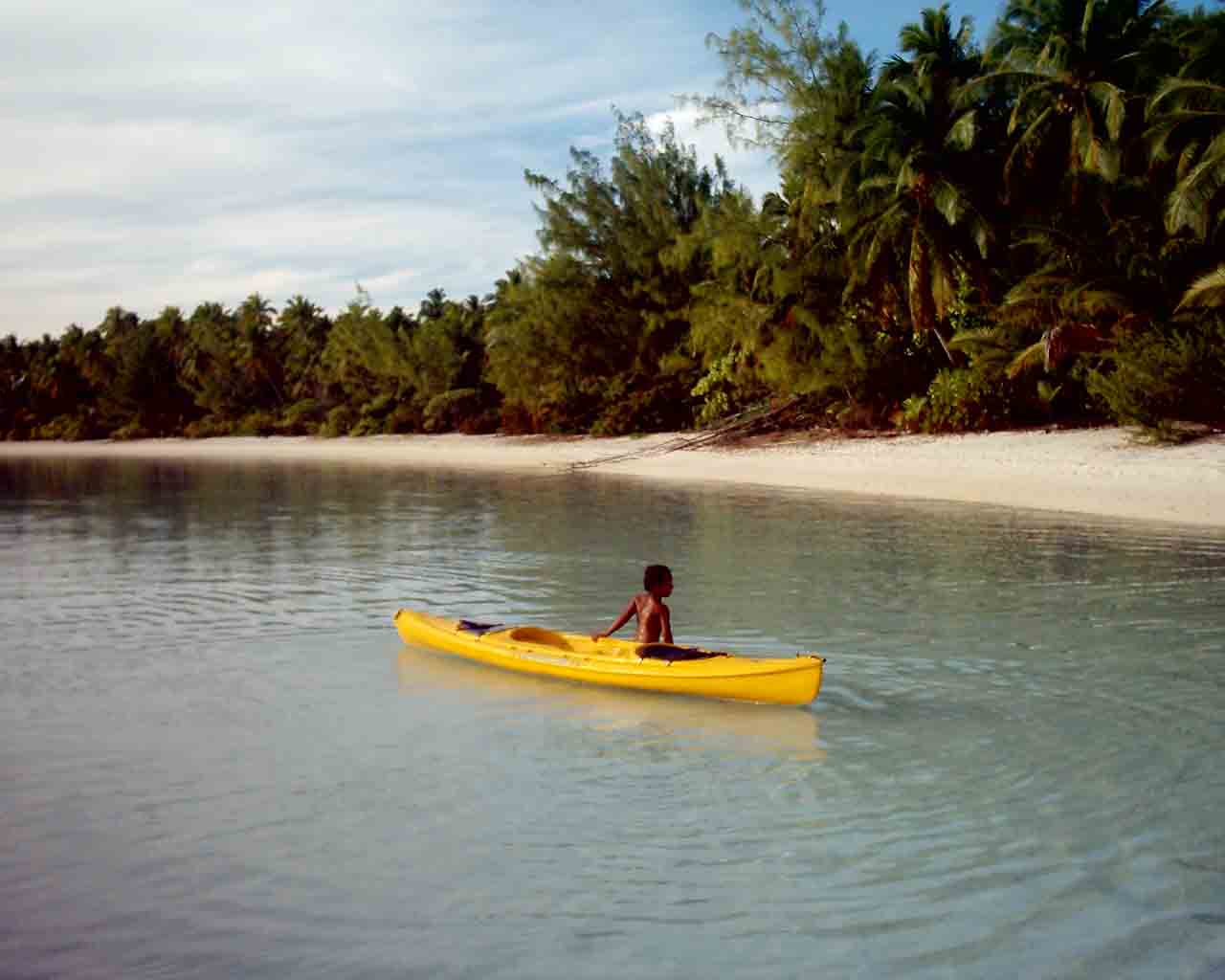
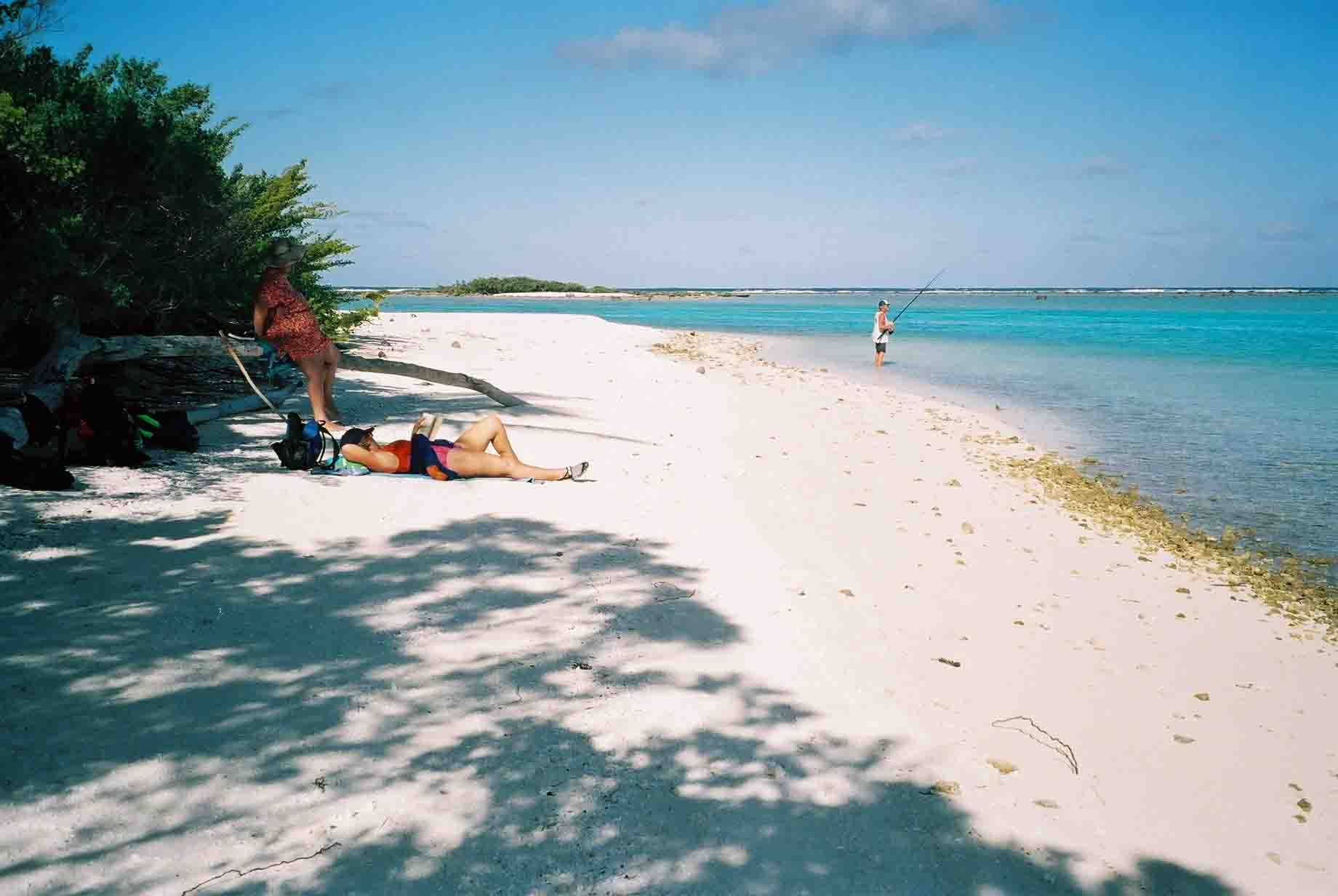
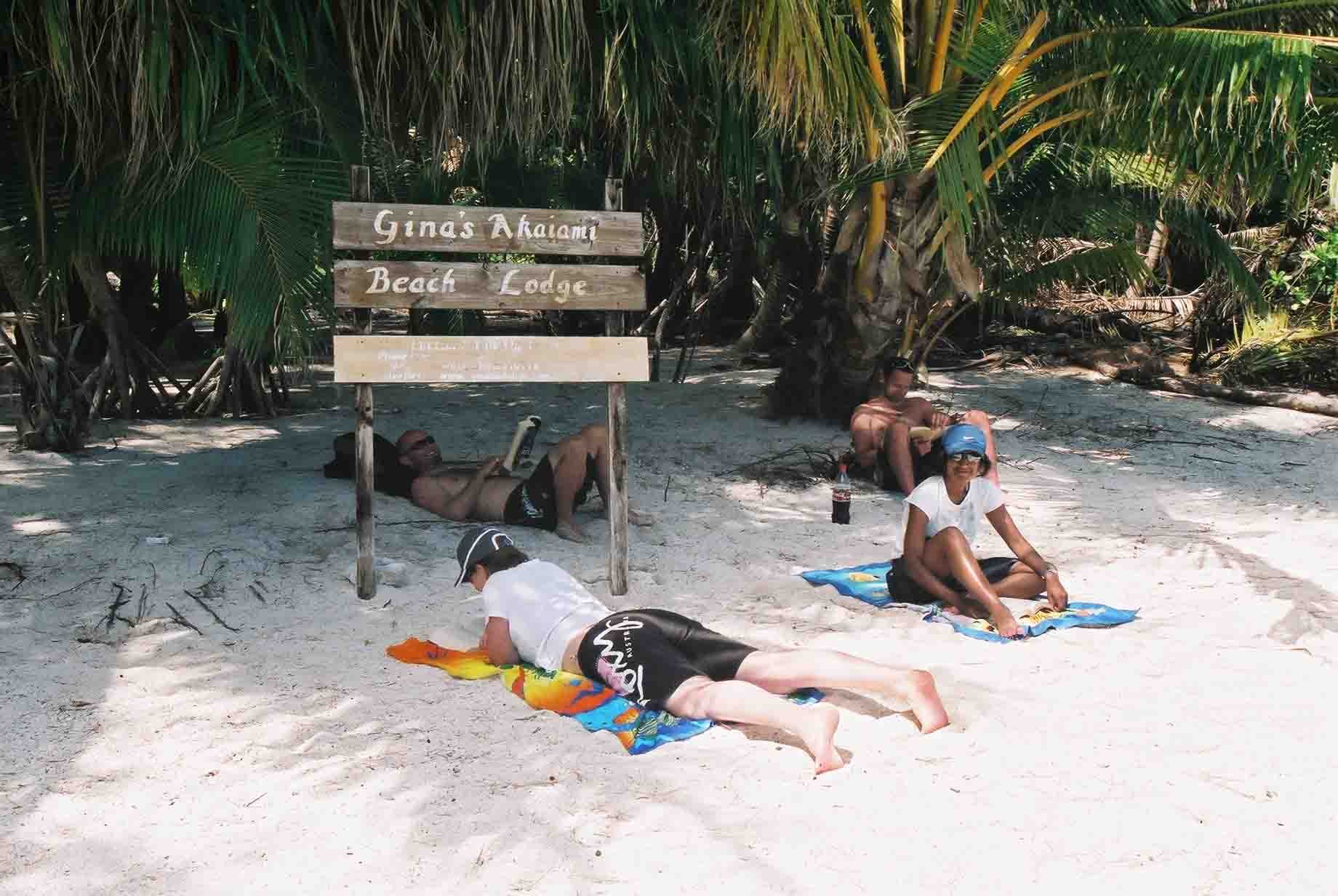
google734ae0a0c5260641.html
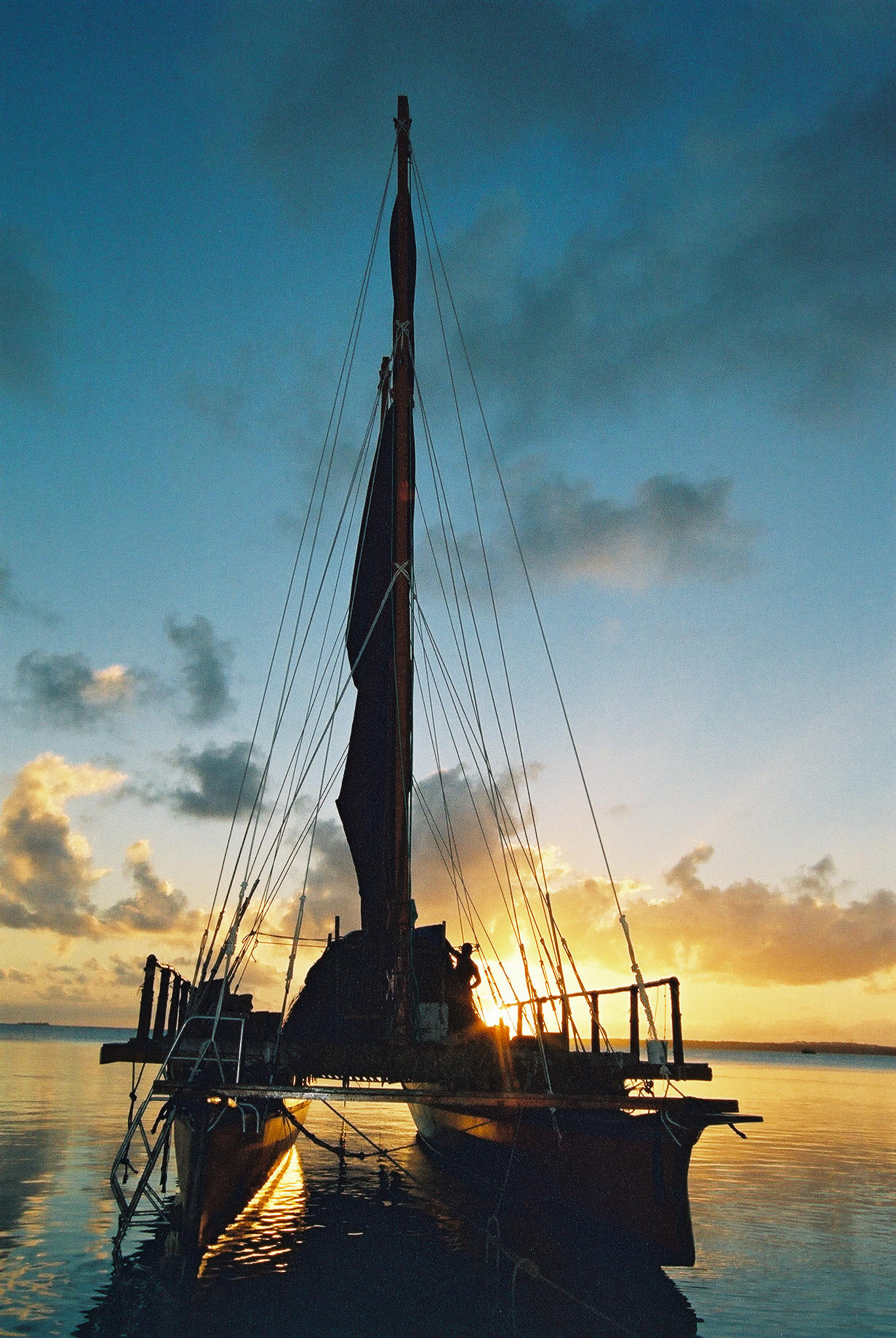
The Dream
Later that evening, cooking my sausages in the kitchen, I thought about the visit to our chambers of the strange Mr Walters, and of his trading outposts up there in the South Sea Islands – some two thousand miles to the North East of New Zealand. Mother had told me something of these islands – she liked living there with those friendly, light brown happy people, and the memories of the golden warmth of the sun on her back, and the limpid blue lagoons, with their palm fringed golden beaches, helped her through the bleaker, colder times of her old age. I know she thought of those days a lot, particularly when the pain of the cancer became hard to bear near the end.
Looking at the cold rain which was now pelting through the windy winter darkness on to the kitchen window pane in this Auckland suburb, I can remember thinking idly that it might be nice to abandon all this forever, and go to live in that world of blue, green and gold far to the North, on one of those idyllic little islands, to be freed of the trammels of this urban existence forever.
Later, just before I went to bed, I took a close look at my father’s picture as it sat on the piano. In the background I could see a coconut tree, and a small beach and even in slightly fuzzy black and white, it looked beautiful - so beautiful and so peaceful. Then, as I lay in the dark, covered with a woollen blanket against the chill of the night, on the bed which I should have been sharing with Ruth, my thoughts wandered, and I remembered childhood stories my mother had related – bedtime stories of warm sultry nights and the scent of flowers pervading every nook and cranny of the old wooden weatherboard house where they had lived. Stories of exotic men and women, exciting dancers, all within a stones throw of the mighty tropical Pacific Ocean, whose murmurs never left the ears, and whose roars would impinge on every level of consciousness.
My mother – Joan – was a sensitive woman who liked to draw and paint. Most of her efforts were lost in a flood, but I had one still, a charcoal drawing of the schooner ‘Tiare Taporo’, Tahitian for “Lime Flower”, anchored in the roadstead at Avarua. It hung on this bedroom wall and the feelings it evoked were always with me – as she herself was always with me. When she died, I was grief stricken for weeks. It was many days before I could even go to work, but I couldn’t settle without constantly thinking of her - of her gentle sweetness, her wisdom, and her kindness to all she came into contact with. The loss, at first, was unbearable.
I lay in the dark, and I could hear her soft voice telling me those bedtime stories - of the schooners, their captains, the crews of brown skinned Polynesian sailors, reputed to be the best of their kind in the world. Possibly some of the last too, because the days of sail were nearly done, and even in the islands, the schooners were being replaced by motor vessels. My mother and father lived in the islands in the last great days of the romantic South Seas, when pearl shell was king, copra was the currency of the day, and the great white sails of the schooners made the South East trades the great driver of commerce.
As I drifted off to sleep, I could hear within my head the soft murmur of reefs I had yet to hear, and in my minds eye saw the crystal lagoons I had yet to see, all the while encapsulated in the soft voice of my beloved mother.
............................................................
The Woman
There was a rustle and Miss China, (for that was what in my fancy I had dubbed her), appeared in the curtained doorway. She was now dressed in a plain white smock, with her pigtails firmly tied back, and she beckoned me to follow her. We climbed up a narrow staircase at the back of the shop to a second story, she leading the way whilst I followed, admiring her shapely legs. I found that upstairs was quite a different world to the coffee bar beneath. At the top of the stairway there was a comfortable waiting room, carpeted with lounge chairs, tables, magazines and flowers whilst Chinese prints hung on the freshly decorated walls. I went to sit down in one of the chairs, but Miss China, as I had begun to think of her, beckoned me through to a corridor, off which several rooms branched. She led me to the door at the end, and we entered a small room, I guess 12 feet square, well furnished with a massage table, a wickerwork cane chair, and a bed with a floral quilt. Miss China closed the door.
She handed me a brightly coloured cotton wrap around – in the East they call them a Sarong, in the Western Pacific a Lava Lava, in the Cook Islands a Pareu.
“You take off clothes and get up on table,” she instructed, indicating a side stand where I was to put my things. At this stage, the drink was starting to wear off, and I was getting cold feet. What kind of a night was this? First losing my wife and only child, then getting tiddly, and ending up in this strange place. She saw my hesitation.
“You need massage. Get up there” she said sternly, pointing to the massage table. I decided to press on, thinking I at least owed some fortitude to my English forbears. I slowly took my clothes off, and wrapped the sarong round my waist before I dropped my pants. Was it amusement that I discerned in those enigmatic dark eyes? Who could tell? I climbed up on the table and lay flat on my stomach, resting my head on a hard little pillow. Meantime, Miss China had switched off the rather harsh main lights, leaving on some mellow side illumination. Rubbing her hands with some fragrant unguent, smelling of some beautiful unknown flower, she started her massage and I could feel those delicate hands smoothing and probing every tired and abused muscle.
She started from my feet and worked her way up, slowly, delicately, relaxing the flesh as her hands glided over me; it was like nothing else I had ever experienced before and I started to mentally drift. The fragrance of the lotion and the perfume of a joss stick mixed and swirled, the scents seeming to blend with the pressure of those soothing sensitive fingers……………
I woke up when the dawn wind fresh from the Waitemata harbour was fluttering the little chintz window curtains, and fingers of pale silvery light were seeping through the room. I was still on the massage table, but someone had covered me with a patchwork quilt, tucking me in as if I were a child. My body felt like liquid velvet – as if it were the body of someone else; it was apparent that I had just gone to sleep during the massage, and Miss China, or whoever else was running the show, had with infinite kindness let me sleep on in comfort and peace. I lay there for a while, not moving, luxuriating in this new found bodily ease, and thinking on the events of the previous night................
....................................................................
It was all word of mouth. Mama Yang had some little cards printed up and the writing could have referred to an exclusive health club; however, this was sufficient to provide quite a tidy income to the small business. Over the time I knew Mama Yang I met some very nice people, both men and women, some of considerable social status, all of whom happily climbed the little stairs up to the parlour for a massage. One was a High Court judge.
I took a while get to sleep that night and my thoughts kept returning to Miss China, and the Hawaiian Hula. I determined to take them up on their invitation and call to see her, and the others, soon. Tomorrow was Friday, no doubt a busy time, and one of the times where they made their money, so my visit would not be so welcome. I concluded that it would be best to call on Sunday, if I could get them to answer the street door.
Closing my mind to thoughts of my personal family problems, I slowly drifted into a slumber, and dreamed all night of Karangahape Road, large plastic bananas, hula dancers, coffee, Mama Yang, Afa, and the girls. Most of all, running like a beautiful river through the deep valleys of my dreams, was Han May – Miss China.
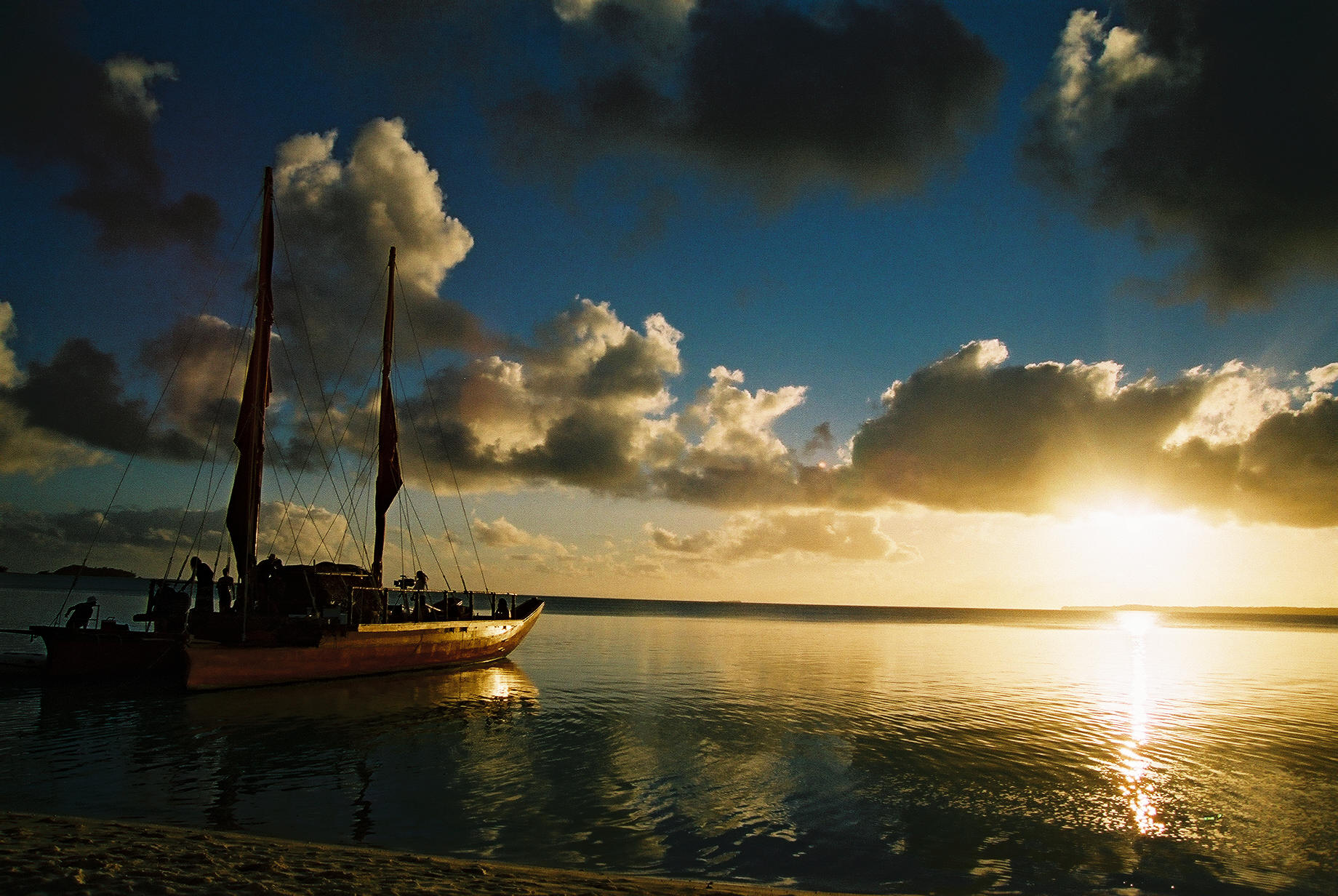
The Ship Arrives at Rarotonga
At around 10 pm, we climbed up to the darkened bridge where a lookout was stationed on one of the wings. It turned out to be Russell, and we spent a while there with him, chatting and watching the sea and the night. It was completely clear, hardly a cloud, and the wind had died to a light air. A half moon had risen in the East, casting its silvery light on the deep purple of the sea, whilst a bright star, probably Venus, hung in the sky. The only sound was the thump thump of the engines, muted to a softness here on the bridge. Miss China put her arm around my waist and we leaned there together, looking out into the half lit night, for the land we knew was there waiting for us.
The breeze made a sudden little flurry, a minute gust, and there it was; I could smell it, the mingled complex scents of flowers and rain washed earth, the scent of the islands. I turned my head towards Miss China but she already knew, and smiled at me in the dark.
We went on to the bridge proper. The brass telegraph shone dully in the subdued lighting by the wheel and the radar set was running. One of the mates had set two chairs for us to sit on; they were like that, very hospitable and thoughtful. They seemed to know of our deep interest in the ship, and in her workings and navigation, and I think they appreciated it.
I took a peep at the radar screen. The sweep was circling round and round at 60 miles range with nothing showing, not even the usual wave clutter, as the sea was so calm – like a lake - truly Pacific. We went out on to the other wing of the bridge, the better to enjoy the beautiful velvet night that was upon us like a dusky sparkled veil. Away from the half moon, still climbing in the Eastern sky, the stars shone with a deep tropical intensity I had not previously seen, even when on hunting trips high in the New Zealand mountains. The wind brought more gentle waves of the perfume of flowers and earth, as if Rarotonga was reaching her hand out to us travellers, still so far at sea, to bid us welcome to her shores, leading us on like a Polynesian Siren.
I looked over to the bridge and I saw that Captain McTavish had come out from his quarters to check on progress; I wondered if he ever slept. I saw him look at the radar and then he turned his head and seeing us on the bridge wing, he beckoned. “Come and see Rarotonga,” he said quietly.
Sure enough, there it was - the blip showing brightly on the edge of the radar screen at maximum range. It was the highest mountain on Rarotonga – Ikurangi, standing as a Polynesian beacon for our questing electronic fingers to seek and find in the darkness of the night, from many miles out at sea.We watched in silence as the blip shone brightly at each sweep. Rarotonga was dead ahead, at a range of about 55 miles.
‘We’ll be dropping anchor off Avarua at first light tomorrow,” Alistair said. “ It’ll take us about 3 days to unload the Rarotonga cargo, and then we’ll be off to Aitutaki. It’s Friday night now, so we anchor Saturday morning, work all through Saturday. No work Sunday –it’s a Church day – so we work again Monday and Tuesday. I hope we can finish so we can depart on Tuesday night, and can arrive Aitutaki early Wednesday morning.”
Shortly after this, he bade us goodnight and returned to his quarters for a sleep, leaving instructions to be called at 3 am, when we would be getting very close to the island.
Bob, the second Mate, was on duty, and we had a chat with him for a while, before deciding to get some rest ourselves as we wanted to get up before dawn, to experience our arrival first hand.
Miss China’s big old alarm clock served us well, and we were awakened at 3 am. We freshened up and sneaked down to the kitchens. Sid, the First Mate, had shown us where a large commercial toasted sandwich machine was left on, with bread and ingredients at hand, so that the night watches could have something to eat and drink. We breakfasted well on toasted ham and cheese sandwiches, ably made by Miss China, whilst I boiled the electric Kettle and made us mugs of instant coffee. It was good to be able to do this, and perked us up for the day ahead. When we had finished our very early breakfast we went up on deck, and climbed to the bridge. The first thing we did was look at the radar. The blip was very close now and we went on to the bridge wing where the lookout stood. He handed Miss China the binoculars, “You can just see the top half of the island,” he told her. She raised them to her eyes and peered intently into the darkness ahead. The night was lit by the half moon, and the darkness was not at all intense.
She spoke.” Yes I see it,” and she handed the binoculars to me. I immediately picked the island up – a grey ghostly mass set against the sky.
The lookout spoke. “We’ll see the shore lights in about another hour’s time.”
Miss China and I walked down to the boat deck and sat in our deckchairs. No one else was abroad in the pre-dawn darkness, just the two of us; it was as if we had our own private yacht.
“I always think of Mama Yang,” she said to me. “ I really miss them all.”
“Me too”, I replied. “Anyway, two years is not so long. We can always go back and see them. We can then decide if we want to go back to Aitutaki, or stay in Auckland. Maybe we should go and visit Afa and your parents in Savaii.”
I could sense this last made her happy.
I got up, “Let’s go to the other side, and see if we can see the island from there.”
The smell of flowers was very strong on the wind now, as we crossed the ship to the other deck. You could now make out the bulk of the Western part of the island – with some lights showing on the shore and the craggy volcanic peaks stood etched against the paling darkness. It was 4.30 am and dawn’s footprints were stealing along the rim of the world, spreading ghostly silver fingers, pushing back the velvet cloak of night to the Westward. The half moon was sinking now into the Western darkness, as if shrinking from the approach of garish day, and the Eastern stars were fading. Still the ship pushed onwards, the steady note of her twin diesel engines punctuating the air with a crisp beat. Miss China held my hand and squeezed; I couldn’t have asked for a more perfect companion and guide. We were getting very close to our destination, the island where I was born, so long ago now, and all the unknown things that awaited us there. Would we find what we sought? Was my father’s ghost awaiting us on Aitutaki?
.....................................................
Aitutaki Island 1962
I saw on the map there was a road that ran around the lagoon side of Aitutaki starting at the shorter of the two airstrips. We found it to be more of a track really, but the Holden coped, even in the muddy bits; but if it had have been raining recently, this road cum track would have been impassable. We passed some of the old style Aitutaki houses, complete with coconut frond thatched roofs and stick walls. Small naked children frolicked in the gardens, yelling and screaming at our passing. Happy looking women waved, and men looked up from their vegetable gardens and smiled.
“This like Samoa,” asserted Miss China. “The house shape different , but we make out of the same stuff – coconut leaves and wood.” I think it made her feel more as if she had come home, to see the people out here living like this. It made her cheerful and I was glad of it.
The road opened up to vast vistas of the biggest tropical lagoon you could ever imagine. Aitutaki lagoon, situated in the vast, sun drenched, watery wastes of Central Polynesia, is the apotheosis of the South Seas fable, the legendary paradise come to life with a touch of the suns wand. Beyond the world, beyond the horizon, half hidden, it lingers as if in its secretive, watery way it were some magic mirror, belonging to a god, reflecting heavens face to some mysterious force far beyond the world of mankind. Gently cradled in the blue green immensity of the Pacific, it has existed for a million years and more, which is old beyond reckoning or comprehension. Its thirty odd miles of creaming lonely reef have seen the march of days beyond number and have resisted storms and tides, hurricanes and monstrous tsunamis that can only lurk as possibilities in the darkness of nightmares. Outside the reef is the Pacific Ocean, which Miss China and myself had crossed on ‘Moana Roa’. We had experienced ourselves this vastness, horizon beyond horizon, enigmatic, offering everything, yet nothing, placid, almost calm when we voyaged to Aitutaki, yet capable of violence beyond belief. Sometimes it’s the ocean we had come to know and love ourselves, an ocean speaking of tranquil laughter, sunshine and woolly clouds. Yet in a flash almost this ocean can change to one of violence and disaster, fearsome, awesome. The ghosts of those that have misjudged this mighty ocean are many. For those lost, drifting on her bosom, the calms can kill as well as the storms. It can become an ocean of excruciating thirst, an ocean of pouring tropical squalls, an ocean of all things, and yet an ocean of nothing, an ocean teeming with life, and also death.
We first saw the Aitutaki lagoon on this Saturday afternoon at its very best, on a calm crystal bright high summer’s day. I couldn’t believe the colours – all shades of blue and turquoise, green and emerald - an artists pallet in the blue and green spectrum. We stopped at a bend in the road, where there was a little bay, and chose a spot for our picnic. I brought our groundsheet and rug from the car, and we settled to enjoy our food. The mosquitoes soon found us, but an ever resourceful Miss China dug out her insect repellent, and this was a great help in keeping them at bay.
“This is the life,” I remarked to her as I munched on one of her peanut butter sandwiches. She smiled, as she ate one herself, and then poured us both a cup of tea out of the Thermos flask.
....................................................
Copyright: Desmond John Clarke - Aitutaki Cook islands 2007